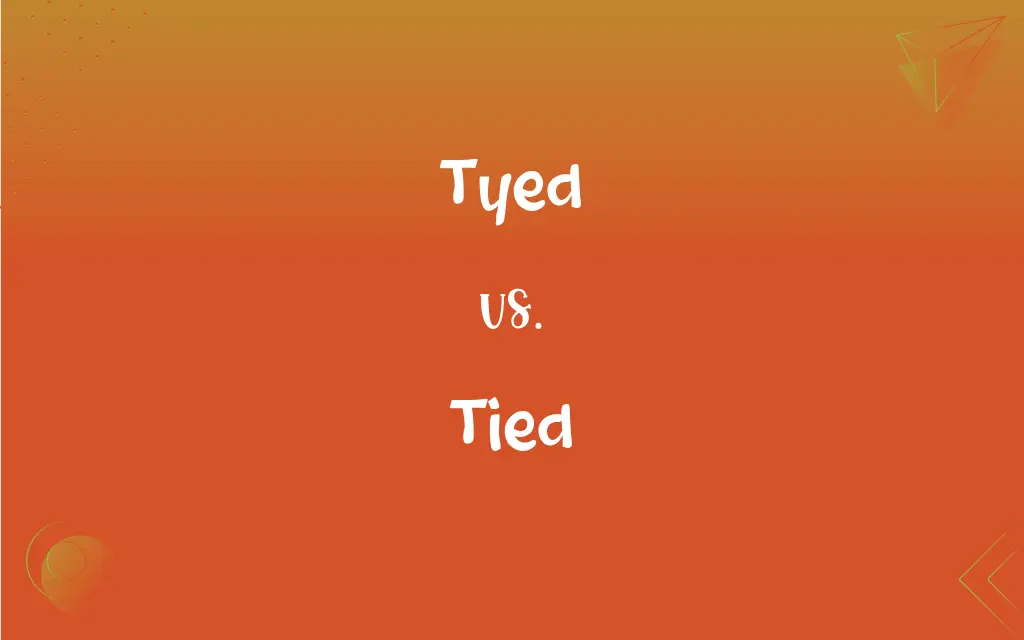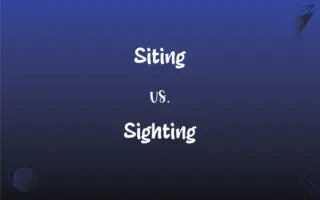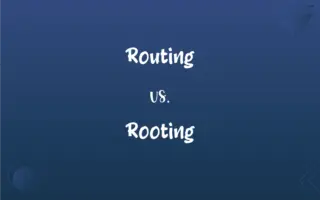Tyed vs. Tied: What's the Difference?
Edited by Harlon Moss || By Janet White || Updated on October 11, 2023
"Tyed" is an archaic spelling for "tied", while "Tied" is the past tense and past participle of "tie", meaning to fasten or bind.

Key Differences
Tyed and Tied can sometimes be a source of confusion due to their phonetic similarity. "Tyed" is an old-fashioned way of spelling and is seldom used in modern English. It harks back to a time when English spelling conventions were not standardized.
Tied, on the other hand, is a word that is familiar to most speakers of English. It is the past tense and past participle form of the verb "tie", which connotes the act of fastening or binding together.
When reading historical documents or classic literature, one might come across the term Tyed. It's essential to recognize that in such contexts, "Tyed" essentially means the same as "Tied".
Modern grammar and spellcheck tools will often flag Tyed as a misspelling. This serves as an indicator of how the word has fallen out of common usage. Meanwhile, Tied is ubiquitous, found in diverse contexts from sports scores to discussions about knots.
Tyed serves as a reminder of the fluidity and evolution of the English language. Tied, while a simple term, is versatile and widely applied, from being tied in a race, having one's shoes tied, or being emotionally tied to someone.
ADVERTISEMENT
Comparison Chart
Usage
Archaic
Modern
Meaning
Fastened (historical)
Fastened or bound
Commonality
Rarely used
Commonly used
Grammar tools flag
Often flagged
Not flagged
Context
Historical documents
Diverse modern contexts
ADVERTISEMENT
Tyed and Tied Definitions
Tyed
An archaic spelling of "tied".
He tyed the package with a string.
Tied
Past tense of "tie", meaning to fasten.
He tied his shoelaces.
Tyed
Obsolete term for being knotted.
The ribbon was tyed in a bow.
Tied
To make by fastening ends or parts
Tie a knot.
Tyed
Historical term for fastened.
Her gown was tyed at the back.
Tied
To confine or restrict as if with cord
Duties that tied him to the office.
Tyed
Classical way of denoting attachment.
He felt tyed to his homeland.
Tied
To be equal in a competition.
The teams were tied at halftime.
Tyed
Old-fashioned version of being bound.
The letters were tyed together.
Tied
Connected emotionally or by obligation.
He felt tied to his family.
Tyed
Simple past tense and past participle of tye
Tied
To fasten or secure with or as if with a cord, rope, or strap
Tied the kite to a post.
Tie up a bundle.
Tied
To fasten by drawing together the parts or sides and knotting with strings or laces
Tied her shoes.
Tied
To put a knot or bow in
Tie a neck scarf.
Tied
To bring together in relationship; connect or unite
Friends who were tied by common interests.
People who are tied by blood or marriage.
Tied
To equal (an opponent or an opponent's score) in a contest.
Tied
To equal an opponent's score in (a contest)
Tied the game with minutes remaining.
Tied
(Music)To join (notes) by a tie.
Tied
To be fastened or attached
The apron ties at the back.
Tied
To achieve equal scores in a contest.
Tied
A cord, string, or other means by which something is tied.
Tied
Something that connects or unites; a link
A blood tie.
Marital ties.
Tied
A necktie.
Tied
A beam or rod that joins parts and gives support.
Tied
One of the timbers or slabs of concrete laid across a railroad bed to support the rails.
Tied
An equality of scores, votes, or performance in a contest
The election ended in a tie.
Tied
A contest so resulting; a draw.
Tied
(Music)A curved line above or below two notes of the same pitch, indicating that the tone is to be sustained for their combined duration.
Tied
Closely connected or associated.
As a couple, they are strongly tied to one another.
Tied
Restricted.
Tied
Conditional on other agreements being upheld.
Tied
That resulted in a tie.
Tied
Provided for use by an employer for as long as one is employed, often with restrictions on the conditions of use.
Tied
(archeology) Having walls that are connected in a few places by a single stone overlapping from one wall to another.
Tied
(philately) a cover having a stamp where the postmark cancellation overlaps the stamp.
Tied
Simple past tense and past participle of tie
Tied
Bound or secured closely;
The guard was found trussed up with his arms and legs securely tied
A trussed chicken
Tied
Bound together by or as if by a strong rope; especially as by a bond of affection;
People tied by blood or marriage
Tied
Fastened with strings or cords;
A neatly tied bundle
Tied
Closed with a lace;
Snugly laced shoes
Tied
Of the score in a contest;
The score is tied
Tied
Being bound or restrained.
She was tied to her commitments.
Tied
Having knots or being knotted.
The rope was tied in several places.
FAQs
Why is "Tyed" rarely seen today?
English spelling has evolved, and "Tyed" is an older form that's fallen out of use.
What does "Tyed" mean?
"Tyed" is an archaic spelling for "tied".
Is "Tied" the correct spelling in modern English?
Yes, "Tied" is the standard spelling in contemporary English.
Was "Tyed" ever a standard spelling?
It was used in the past, especially before spelling conventions were standardized.
Can "Tied" mean being at an equal score in a game?
Yes, teams can be "tied" if they have the same score.
Is "Tyed" considered incorrect?
In modern usage, "Tied" is preferred, but "Tyed" is historically accurate.
What's the verb form for "Tied"?
"Tie".
Is "Tied" only related to knots?
No, "Tied" can refer to knots, competitions, emotions, or obligations.
Can I use "Tyed" in formal writing?
It's best to use "Tied" unless you're writing in a historical context.
Can "Tied" be used figuratively?
Yes, like being "tied" to a place or emotion.
About Author
Written by
Janet WhiteJanet White has been an esteemed writer and blogger for Difference Wiki. Holding a Master's degree in Science and Medical Journalism from the prestigious Boston University, she has consistently demonstrated her expertise and passion for her field. When she's not immersed in her work, Janet relishes her time exercising, delving into a good book, and cherishing moments with friends and family.
Edited by
Harlon MossHarlon is a seasoned quality moderator and accomplished content writer for Difference Wiki. An alumnus of the prestigious University of California, he earned his degree in Computer Science. Leveraging his academic background, Harlon brings a meticulous and informed perspective to his work, ensuring content accuracy and excellence.































































